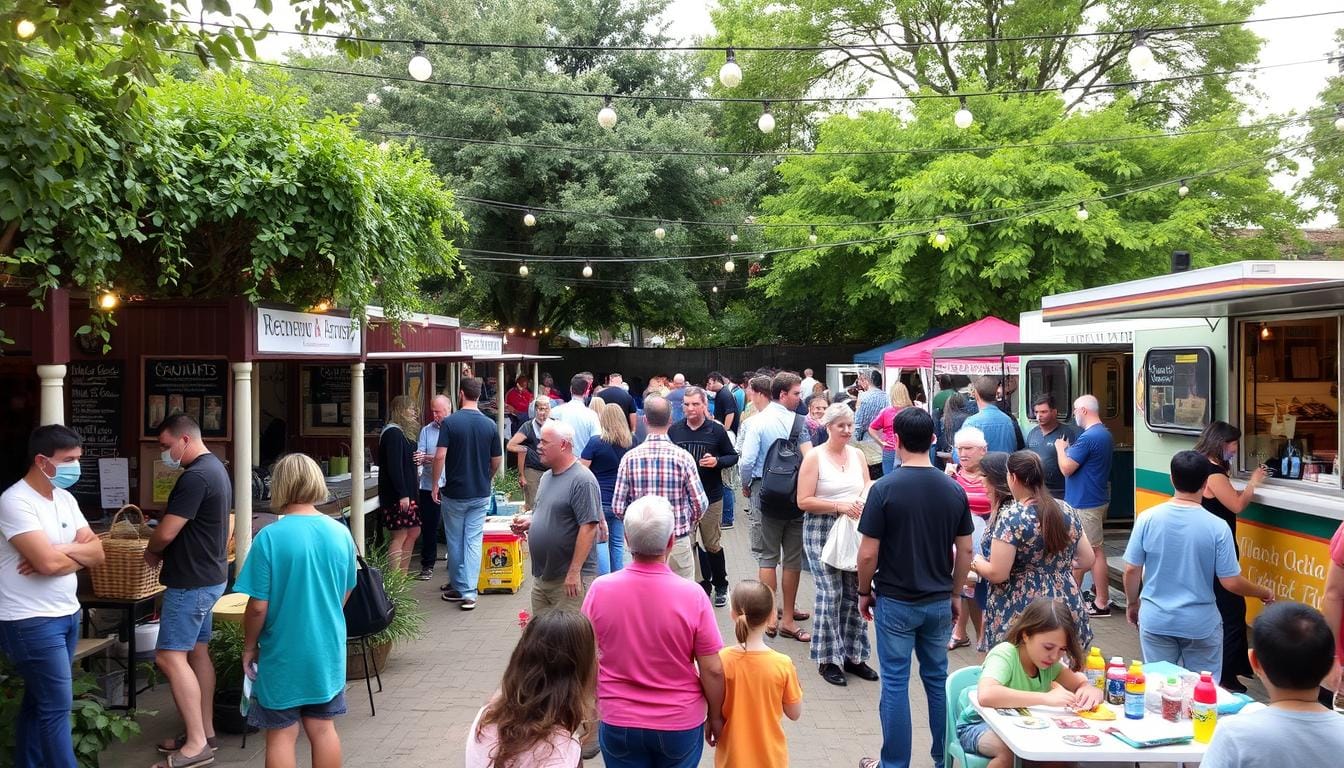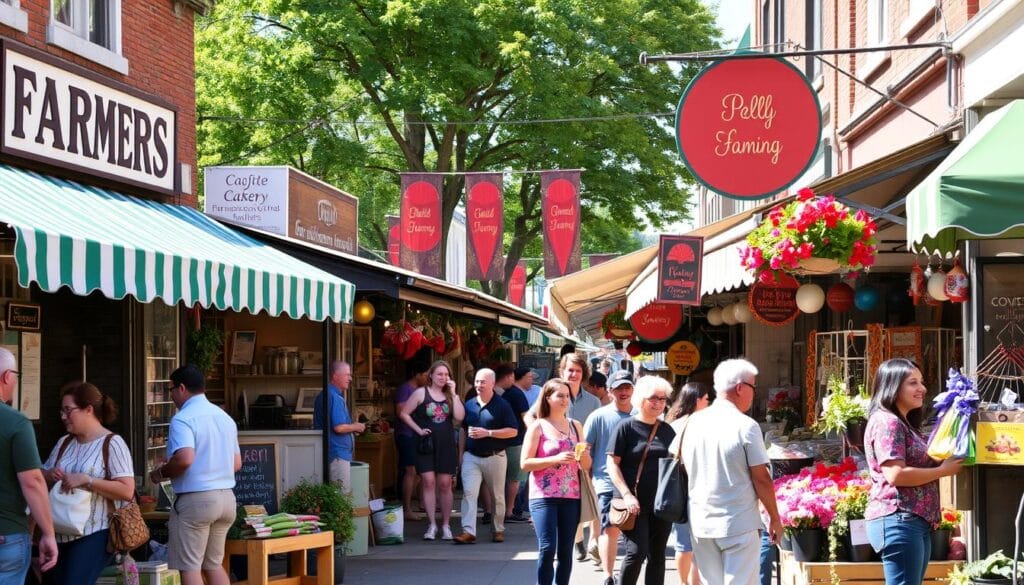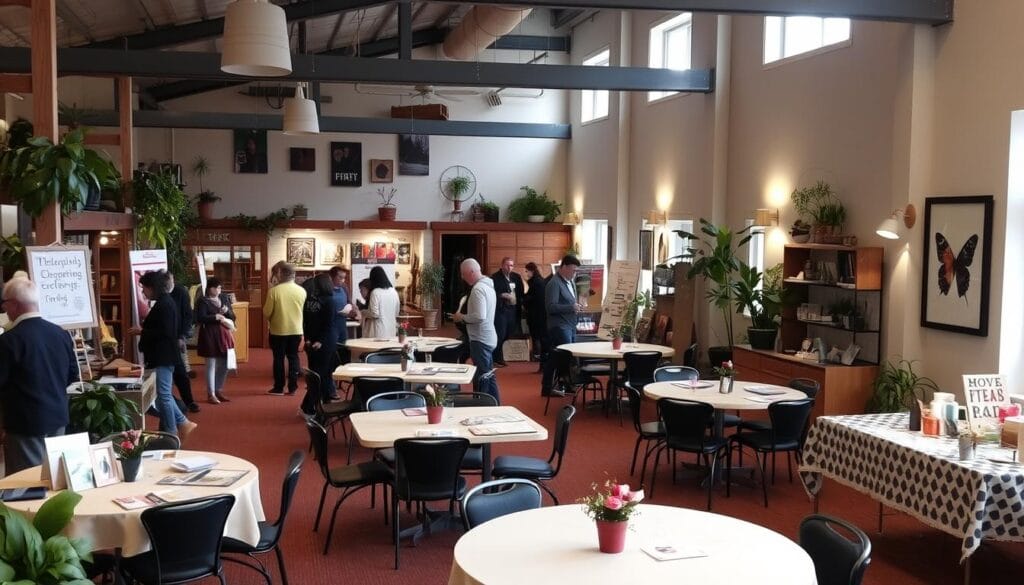Creative Event Ideas for Small Business Success

As a small business owner, you know how important it is to connect with your team and customers. Corporate events are more than just fun. They help build team spirit, celebrate achievements, and make a lasting impression.
Research shows that engaged team members are 23% more profitable and 18% more productive. This makes events an important part of your strategy. They should inspire, entertain, and delight everyone involved.
But where do you start? There are countless ways to create memorable experiences that fit your brand and engage your audience. Whether it’s a networking mixer, a workshop, or a community service event, this guide will help you get started.
Table of Contents
Understanding Your Audience for Event Planning
To make great business anniversary event ideas or business open house event ideas, knowing your audience is key. Get direct feedback from customers through surveys, on email or social media. Ask about their favorite event types, best venues, fun activities, and the best times to hold events.
Also, check your website, email, and social media stats. See which content themes your audience likes most.
Conducting Surveys and Feedback Sessions
Surveys are great for finding out what your customers want and like. Ask about their event-going habits, favorite activities, and if they’d join certain events. Look at the survey answers to spot trends that help plan your events.
Analyzing Customer Behavior
- Look at your website and social media analytics to see what content your audience likes.
- Find out the topics, formats, and how people engage with your content.
- Use this info to plan events that match your customers’ interests and get them to attend.
By using customer feedback and analyzing their behavior, you can create business anniversary event ideas and business open house event ideas that really grab your audience’s attention. This can help your business grow and succeed.
Types of Events to Boost Small Business Engagement
Hosting events is a great way for small business owners to connect with their audience. It increases sales and builds brand loyalty. There are many event ideas to choose from, like networking mixers and community service projects. Let’s look at some effective event types to boost small business engagement.
Networking Events
Networking events are perfect for small business owners to meet new people. You can host a happy hour mixer, speed networking, or a panel with local entrepreneurs. These events offer a relaxed yet productive setting for making connections.
Workshops and Seminars
Offering educational workshops and seminars can make your business look like an expert. You can teach topics related to your products or services, or invite guest speakers. These events engage your audience and make your brand a trusted resource.
Community Service Events
Giving back to the community is an effective way to improve your brand’s image. You can organize a volunteer project, a fundraiser, or a donation drive. According to Clutch, 75% of people are more willing to buy from companies that support causes they do. These events show your business cares about the community.
Choosing the right event is key. It should align with your company’s beliefs and identity and appeal to your audience. Hosting engaging events can help you build strong relationships, increase sales, and lead in your industry.
Seasonal Events to Capitalize On
As a small business owner, using seasonal events can really help. It boosts engagement, drives sales, and creates lasting memories for customers. Whether it’s holiday promotions or summer festivals, there are many chances to show off your brand and connect with people all year.
Holiday-Themed Promotions
Holiday parties are back, and people are excited to get together again. Hosting festive events like karaoke nights or baking contests can bring your team closer. It’s also a great way to show your employees you care, as 79% of those who leave say they didn’t feel appreciated.
For your customers, think about holiday-themed products or deals. Use the season to create special experiences that fit your brand and what your customers like. This might include unique items for Valentine’s Day or special discounts for New Year’s.
Summer Outdoor Festivals
- Hosting a summer outdoor festival is a great way to connect with your community and show off your business.
- Plan fun activities like outdoor movies, live music, or workshops to draw in different people.
- Get your customers involved with fun activities like an Easter egg hunt or a Halloween pumpkin contest.
- Use social media to build excitement and buzz for your event.
The secret to great seasonal events is to match what your audience wants and needs. By taking advantage of the right opportunities, you can increase engagement, sales, and your business’s standing in the community.
Collaborating with Other Local Businesses
Working together with other local businesses can really help with event planning ideas for business and small business event ideas. You can share audiences, promote each other, and make events that help everyone. This can boost engagement and sales.
Joint Events for Shared Audiences
Think about teaming up with businesses that fit well with yours. For instance, you could work with an auto brand and a gas company for an eco-driving workshop. Or, partner with food suppliers and grocery stores for tastings in stores.
By matching your products and reaching more people, you can promote more while sharing costs.
Cross-Promotion Strategies
- Use joint referral programs to get more customers, like Dropbox did.
- Collaborate on workshops and educational seminars to get more visibility and build community.
- Offer bundled products and services that go well together, making you stand out.
- Work together to get bulk discounts and cut costs, like local restaurants do.
- Be sponsors for local events to strengthen community bonds and increase sales.

When looking for partners, make sure your brands and markets fit well. This way, you can use each other’s strengths, reach more people, and build a strong business community together.
Utilizing Social Media for Event Promotion
Social media is essential for small businesses to interact with customers and advertise events. It’s great for business networking events or brand experiences. Using social media can make your event popular, attract more people, and build a community.
Creating Buzz with Contests
Running social media contests is a good way to get people excited about your event. Give out cool prizes like free tickets or special experiences. Ask your followers to like, share, or make content about your event.
This not only promotes your event but also helps you learn what your audience likes.
Leveraging Influencers
Working with social media influencers can really boost your event’s visibility and trustworthiness. Find influencers in your field with lots of followers. Work with them to make sponsored posts, attend your event, or even host their own events. This can bring in new people and make your event’s marketing more believable.
By using social media contests and influencer partnerships, small businesses can make their events more popular. This can lead to more people attending and getting involved. Always check your social media stats to see how well your promotions are doing. This helps you make better choices for future events.
Crafting an Inviting Atmosphere
Planning a great business anniversary event or a fun corporate gathering? The atmosphere you create is key. The venue selection and event decor set the tone. They make sure your guests feel welcome and engaged.
Importance of Venue Selection
The venue should match your brand and event theme. Look for unique spaces that spark curiosity and imagination. Museums, art galleries, craft distilleries, and outdoor parks are great options. They appeal to your target audience’s interests.
Tips for Event Decor
- Incorporate your branding elements into the decor to show your company’s identity and values.
- Use creative lighting to set the mood and highlight important areas.
- Add interactive elements like photo booths or hands-on activities to get guests involved.
- Work with local artists or vendors to add unique, custom-made touches that show your community spirit.
By choosing the right venue and decor, you create a memorable atmosphere. It leaves a strong impression on your guests and strengthens their bond with your business. Whether it’s a business anniversary event or a fun corporate gathering, these details are crucial for success.

Measuring the Success of Your Events
Hosting successful events is crucial for engaging customers and growing your small business. However, how can you determine whether your event was a success? By tracking key performance indicators (KPIs) and gathering feedback after the event, you can see its impact. This helps you improve your event ideas for businesses and aim for future successes.
Key Performance Indicators to Track
To check if your event was successful, focus on metrics that match your goals. Common KPIs include:
- Attendance rates – Did you attract the number of attendees you wanted?
- Engagement levels – How much did attendees get involved in activities and connect with your brand?
- Social media mentions – Did the event create buzz on Twitter, Instagram, and Facebook?
- Lead generation – Did the event bring in new prospects or sales?
Gathering Post-Event Feedback
It’s also key to get feedback straight from attendees. Use surveys, interviews, or focus groups to find out what they liked, what could be better, and if the event met their expectations. This feedback is gold for improving your event ideas and showing the value to stakeholders.
By tracking KPIs and gathering feedback, you can make your events better. This ensures you’re creating memorable experiences that help your business grow.
Budget-Friendly Event Planning Ideas
Planning fun events for your small business doesn’t have to cost a lot. With some creativity and smart planning, you can make memorable events that won’t empty your wallet. Here are some ideas to help you plan a great event without spending too much.
Utilizing In-Kind Donations
Try reaching out to local businesses or partners for in-kind donations. Instead of paying for things like venues, food, or entertainment, see if they can help out. This way, you can save money and give your guests a great experience.
DIY Decorations and Marketing Materials
Let your team’s creativity shine by making DIY decorations that fit your event’s theme. You can make everything from centerpieces to signs yourself. Plus, design your own marketing materials like flyers and social media posts to save on professional design costs.
The secret to planning events on a budget is to be creative and use what you already have. With a bit of imagination and hands-on effort, you can create event planning ideas for business that wow your guests and won’t break the bank.
Engaging Behind the Scenes with Your Team
To make your business networking events a hit, get your team involved from start to finish. Their diverse talents and views can bring fresh ideas and excitement to your events. This way, everyone feels part of the action.
Employee Involvement in Event Planning
Give each team member a position that plays to their interests and strengths. This approach lets them use their skills and feel important in planning. Hold brainstorming sessions where they can share business networking event ideas and help shape the event’s direction.
Benefits of Team-Building Events
- Improved Collaboration: Activities like outdoor adventures, cooking classes, or volunteer work can boost communication and team bonds.
- Increased Morale: Valuing and involving your team can make them happier, more satisfied, and create a positive work atmosphere.
- Innovative Ideas: Employees’ varied perspectives can lead to unique event planning business name ideas and creative solutions.
Getting your team involved behind the scenes leads to better events and a stronger team. Let your employees’ collective power create unforgettable experiences for your small business.
Virtual Events: Adapting to the Digital Age
The pandemic changed the event industry a lot. Now, we use virtual and augmented reality for online experiences. As a small business owner, this change is a chance to connect with people in new ways. It’s a chance to make events that grab and hold your customers’ attention.
Tools for Effective Online Engagement
Tools like Zoom, Hopin, and Remo have cool features for virtual events. Use live polls, breakout rooms, and networking tools. They help make your event fun and keep people interested.
Creative Formats for Virtual Events
- Virtual Scavenger Hunts and Online Escape Rooms are fun ways to get people together. They also spark friendly competition.
- Digital Product Launches let you show off your products in a fun way. You can have Q&A sessions and virtual demos.
- Virtual Game Nights and Themed Breakout Sessions are great for socializing and exploring interests online.
Virtual events open up the world to you. They save on costs and help you make lasting memories. This can boost your brand and reach more people.
Success Stories: Case Studies of Effective Events
Exploring real-life success stories can inspire and guide your event planning for your small business. Let’s look at how some businesses got creative with their events and what they learned.
Businesses that Got Creative
BACH, a local tech company, hosted a virtual reality product demo event. They made the event unforgettable by blending their design into the virtual venue and adding a light show. This created buzz and boosted product pre-orders.
The Party People, an event planning firm, showed resilience at an international conference when a power outage hit. They quickly switched to a backup generator, keeping the event going. This earned them praise for their quick thinking and professionalism.
Simply Decor and Events, a small home decor business, organized a community cook-off. This event increased store foot traffic and brought the neighborhood together. They made $420,000 in annual revenue with just 2 people, thanks to their creativity and neighborhood engagement.
Lessons Learned from Past Events
These stories show the importance of detail, adaptability, and community engagement in event planning. By adding your brand’s unique touch, being ready for surprises, and connecting with your audience, you can make events that truly make an impact.
When looking into business anniversary event ideas and event planning ideas for business, remember these success stories. Use the strategies that worked for others and try new, creative ideas to stand out. With the right approach, your events can boost engagement, loyalty, and help you reach your goals.






